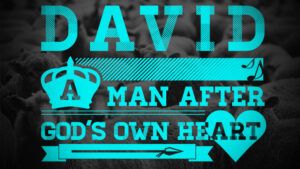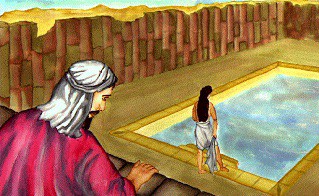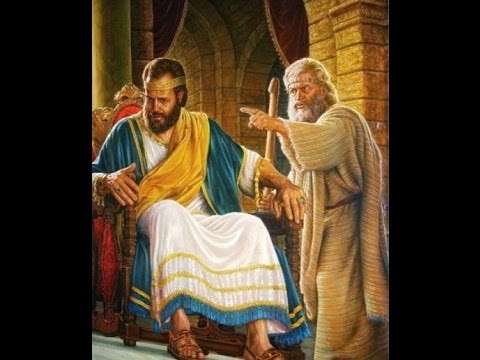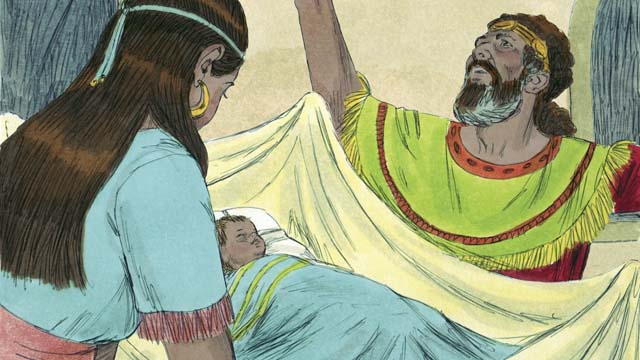Recently, an article was published on this website entitled The Danger of Sin.
The article focused on sin mainly on a national, country level. This article focuses on sin and consequences on a more personal level.
That piece explains in detail what sin is, which is basically a transgression against God’s Law. Does God forgive us of our transgressions? Yes, He does. But is that the end of the story? Do we live happily ever after? Not necessarily.
The Consequences of Sin
It is crucial for us to realize that even though God forgives us of our sins, there may still be consequences as a result.
These consequences are the manifestation of one of God’s universal laws found in Scripture.
Gal 6:7
7 Be not deceived; God is not mocked: for whatsoever a man soweth, that shall he also reap.
We reap what we sow—even after forgiveness.
There is no more explicit example of this in the Scriptures than the account with King David and Bathsheba. This is a well-known Biblical account, but we will take a look for those who are unfamiliar.
The first king of Israel, Saul, was disobedient, and God removed him as king. Samuel the prophet announced this to Saul, 1 Sam 13:13-14
13 And Samuel said to Saul, Thou hast done foolishly: thou hast not kept the commandment of the Lord thy God, which he commanded thee: for now would the Lord have established thy kingdom upon Israel for ever.
14 But now thy kingdom shall not continue: the Lord hath sought him a man after his own heart, and the Lord hath commanded him to be captain over his people, because thou hast not kept that which the Lord commanded thee.
The man after God’s own heart was David. Therefore, David was highly  favored by God.
favored by God.
However, along the way, David engaged in some unfavored behavior. 2 Sam 11:2-6
2 One evening David got up from his bed and walked around on the roof of the palace. From the roof he saw a woman bathing. The woman was very beautiful, (3) and David sent someone to find out about her. The man said, “Isn’t this Bathsheba, the daughter of Eliam and the wife of Uriah the Hittite?” (4) Then David sent messengers to get her. She came to him, and he slept with her. (She had purified herself from her uncleanness.) Then she went back home. (5) The woman conceived and sent word to David, saying, “I am pregnant.” NIV
So David committed the sin of adultery, and Bathsheba conceived. However, that isn’t the end of the story.
2 Sam 11:6-14
6 So David sent this word to Joab: “Send me Uriah the Hittite.” And Joab  sent him to David. 7 When Uriah came to him, David asked him how Joab was, how the soldiers were and how the war was going. 8 Then David said to Uriah, “Go down to your house and wash your feet.” So Uriah left the palace, and a gift from the king was sent after him. 9 But Uriah slept at the entrance to the palace with all his master’s servants and did not go down to his house.
sent him to David. 7 When Uriah came to him, David asked him how Joab was, how the soldiers were and how the war was going. 8 Then David said to Uriah, “Go down to your house and wash your feet.” So Uriah left the palace, and a gift from the king was sent after him. 9 But Uriah slept at the entrance to the palace with all his master’s servants and did not go down to his house.
David sent for Uriah, Bathsheba’s husband, to come home so that he would sleep with his wife so that he would think the child was his. However, he did not go home.
10 When David was told, “Uriah did not go home,” he asked him, “Haven’t you just come from a distance? Why didn’t you go home?”
11 Uriah said to David, “The ark and Israel and Judah are staying in tents, and my master Joab and my lord’s men are camped in the open fields. How could I go to my house to eat and drink and lie with my wife? As surely as you live, I will not do such a thing!”
Uriah was an honorable man with a conscience and would not enjoy the comforts of home while his fellow soldiers were out fighting in the fields.
12 Then David said to him, “Stay here one more day, and tomorrow I will send you back.” So Uriah remained in Jerusalem that day and the next. 13 At David’s invitation, he ate and drank with him, and David made him drunk. But in the evening Uriah went out to sleep on his mat among his master’s servants; he did not go home. NIV
David made one last futile attempt for Uriah to go home, even making him drunk. However, again, he did not go home. So what would David do now?
2 Sam 11:14-27
14 In the morning David wrote a letter to Joab and sent it with Uriah. 15 In it he wrote, “Put Uriah in the front line where the fighting is fiercest. Then withdraw from him so he will be struck down and die.”
16 So while Joab had the city under siege, he put Uriah at a place where he knew the strongest defenders were. 17 When the men of the city came out and fought against Joab, some of the men in David’s army fell; moreover, Uriah the Hittite died.
Unwittingly, Uriah delivered the letter containing his death sentence to Joab, and he was killed for being a loyal, conscientious soldier. David had now committed murder and had blood on his hands
18 Joab sent David a full account of the battle. 19 He instructed the messenger: “When you have finished giving the king this account of the battle, 20 the king’s anger may flare up, and he may ask you, ‘Why did you get so close to the city to fight? Didn’t you know they would shoot arrows from the wall? 21 Who killed Abimelech son of Jerub-Besheth? Didn’t a woman throw an upper millstone on him from the wall, so that he died in Thebez? Why did you get so close to the wall?’ If he asks you this, then say to him, ‘Also, your servant Uriah the Hittite is dead.'”
David’s objective was complete; Uriah was dead.
22 The messenger set out, and when he arrived, he told David everything Joab had sent him to say. 23 The messenger said to David, “The men overpowered us and came out against us in the open, but we drove them back to the entrance to the city gate. 24 Then the archers shot arrows at your servants from the wall, and some of the king’s men died. Moreover, your servant Uriah the Hittite is dead.”
David should have been devastated to have lost such a devoted man of valor. But…
25 David told the messenger, “Say this to Joab: ‘Don’t let this upset you; the sword devours one as well as another. Press the attack against the city and destroy it.’ Say this to encourage Joab.”
There was no remorse whatsoever. So just carry on—business as usual.
26 When Uriah’s wife heard that her husband was dead, she mourned for him. 27 After the time of mourning was over, David had her brought to his house, and she became his wife and bore him a son. But the thing David had done displeased the Lord. NIV
Everything was done properly. Bathsheba mourned her husband for the proper amount of time, David did the right thing and married her, and he had a SON, how great. However, God was displeased. Let’s see what happens next.
2 Sam 12:1-6
The Lord sent Nathan to David. When he came to him, he said, “There were two men in a certain town, one rich and the other poor. 2 The rich man had a very large number of sheep and cattle, 3 but the poor man had nothing except one little ewe lamb he had bought. He raised it, and it grew up with him and his children. It shared his food, drank from his cup and even slept in his arms. It was like a daughter to him.
4 “Now a traveler came to the rich man, but the rich man refrained from taking one of his own sheep or cattle to prepare a meal for the traveler who had come to him. Instead, he took the ewe lamb that belonged to the poor man and prepared it for the one who had come to him.”
5 David burned with anger against the man and said to Nathan, “As surely as the Lord lives, the man who did this deserves to die! 6 He must pay for that lamb four times over, because he did such a thing and had no pity.” NIV
David did not realize that Nathan the prophet was portraying him, and his reaction confirmed his guilt and fate. Now what?
2 Sam 12:7-12
7 Then Nathan said to David, “You are the man! This is what the Lord, the God of Israel, says: ‘I anointed you king over Israel, and I delivered you from the hand of Saul. 8 I gave your master’s house to you, and your master’s wives into your arms. I gave you the house of Israel and Judah.

And if all this had been too little, I would have given you even more. 9 Why did you despise the word of the Lord by doing what is evil in his eyes? You struck down Uriah the Hittite with the sword and took his wife to be your own. You killed him with the sword of the Ammonites. 10 Now, therefore, the sword will never depart from your house, because you despised me and took the wife of Uriah the Hittite to be your own.’
11 “This is what the Lord says: ‘Out of your own household I am going to bring calamity upon you. Before your very eyes I will take your wives and give them to one who is close to you, and he will lie with your wives in broad daylight. 12 You did it in secret, but I will do this thing in broad daylight before all Israel.'” NIV
God’s judgment against David was harsh. However, take a look at what follows.
Verse 13, Then David said to Nathan, “I have sinned against the Lord.“NIV
After Nathan had snatched the cover off his sins, David confessed his sin. It is during this time that David wrote Psalm 51.
What’s next?
Nathan replied, “The Lord has taken away your sin. You are not going to die.
Nathan confirmed to David that the Lord had taken away his sin—he was forgiven, and his life was spared. So all is clear, right? Not exactly.
14 But because by doing this you have made the enemies of the Lord show utter contempt, the son born to you will die.” NIV
David’s sin dishonored God greatly. If he had not punished David, it could have made God look as though He approves evil. This sin of David’s would cause people to dishonor God. Punishment also discourages others from committing the same sin. The child did die (vs. 18).

However, that was only the beginning. The prophecy in these verses came true. For the reason that David murdered Uriah and stole his wife,
(1) murder became a perpetual threat in his family (chap.13:26-30; 18:14,15; 1 Kings 2:23-25);
(2) his household revolted against him (15:13);
(3) his wives were given to another(his son) in public view (16:20-23).
Was it worth it? Probably if David had known the painful consequences of his sin, he might not have pursued the pleasures of the moment. This chastisement followed David for the rest of his life. You can read the details in the captioned Scriptures in parenthesis.
The Takeaway and Life Application
Repentance and forgiveness do not eliminate consequences. No one repented stronger than David did, yet he was severely punished for his sins.
Most individuals feel that when they repent and are forgiven of their transgression, that is the end of the story, and no more punishment should occur. However, as we see in this account in the Scriptures, that is not always the case.
We must heed the Scriptures. 1 Cor. 10:11-13
11 These things happened to them as examples for us. They were written down to warn us who live at the end of the age.
God bestowed the Scriptures upon us to show us examples to warn us of the

consequences.
12 If you think you are standing strong, be careful not to fall.
David: loved and anointed by God as King of Israel, a man “after God’s own heart” crumbled under temptation. The lesson: no one is immune to temptation so, we must never think that we are standing too strong to fall.
13 The temptations in your life are no different from what others experience. And God is faithful. He will not allow the temptation to be more than you can stand. When you are tempted, he will show you a way out so that you can endure. NLT
Temptation has been around from the beginning. No temptation we face today is unique.
David was given “a way out.” He was told that Bathsheba was Uriah’s wife, but he did not take heed.
Yes, God forgives our transgressions. But we must remember that there may be a severe consequence that cannot be reversed. We will reap what we sow, and sometimes more than we sow.
Sin is like scar tissue from a womb. Long after the womb has healed, the scar remains. May the Lord help us always to consider the consequences of our actions.
Amen.
You are welcome to leave any comments, questions, or concerns below.
Blessings!

We are never better off after sin. Sin if deterioration. As parents we never would prohibit something to our children that will do them good. But we are not perfect, and this may come to pass (because of our limitations in understanding). But God is perfect, and if He says NO, it will surely do us harm!
Amen Ann! After all the Scripture says in Deut 10:12-13
12 And now, O Israel, what does the Lord your God ask of you but to fear the Lord your God, to walk in all his ways, to love him, to serve the Lord your God with all your heart and with all your soul, 13 and to observe the Lord’s commands and decrees that I am giving you today for your own good? NIV
Thanks for commenting!
Even though i’m not religious and dont believe in the God that most Christians or any other religions believe in, I agree with you. I believe in the God of the Bible, who,is Science. The science of human behaviour and human nature. The science of what causes to become. This God is called YHWH or in EXACT translation is ’causes to become’. theres no mention of Godsh here, no HE or SHE or even THEM. Just YHWH.However, teaching people these consequences has no gain to the power hungry. So, it came to be that the men whop longed for power placed a veil on this word YHWH by placing the word ‘He’ at the beginning of it.This then turned the word into a personality, a HE, a Being, or a God. This actually breaks the very first commandment that only worship of YHWH and no other shall be permitted.Dont belive me?Go back to Genesis Chapter 1.1 and start reading te Bible again, only this time wherever the word God has been used to replace the original word YHWH, wich is almost every time, think of what caused to become. So what caused to become told Adam, Eve, Enoch, Noah, and most refinedly Moses.Perhaps if people actually taght the truth of the Bible instead of creating Mythological Charachters, then people may learn more about these consequences by actually reading the Bible. Instead they are repelled by stories that no longer work on the [people in the modern day, because science tells us otherwis. It also proves otherwise. But once again, go bac and read each mention of God as ’caused to become’ and see if it contradicts science. You may be surprised to see that the Bible woks in harmony with science when read right.Moses knew this. That is why he banned all mythological Gods. Actually he condemnded it twiicwe for Good measure. Once in the first that nobody should follow anything but what causes to become (in other words, science). Then he is specific about that by condemning idolotary.. This meant ALL Idols. Not just the ones that the church decides not to keep, the main one being the God that Christians teach.These ancient civilisations like Egypt and Israel were by no means stupid. They had scientists who studied constantly. Only they werent called scientists, they were called High Preists. If they told the common people it was Science that told them these wise words, then it would be profitless. So they veiled it. They even banned the word YHWH just in case anyone worked it out. Then they built fancy Gold Arks and Put up curtains to emphasise that it was a big secregt.WEhy?Because they didnt want the people to know that the Bible was that siple.When the Romans came alongh and saw that this worked, but was restricted to Jews only, they embraced Christianity and Promoted it in the end. This was because to them, it was the ultimate control. It also worked for all. No Gentile exclusion. This meant that they could techncally rule the world with this. So the Catholic Church kept theis writing secret for another millenium.It’s all there in Black and White. It always was and nobody ever needed a license to read wisdom. They just convinced everyone that they did.Try teaching this truth and I believe that more people would take an interest.carry on telling people Gods a guy in the sky and that men were made of dust and women from ribs, and then its small wonder that people are lost in this day and age.Amen
My observation of science is the effort to remove the creation altogether and promote evolution.
Thanks for commenting!